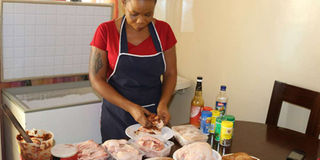Here’s my recipe to reap from broilers

Kisumu poultry farmer, Caroline Oloo, prepares marinated chicken in her establishment. She slaughters her mature chicken and add value to the meat by marinating or grilling before selling in parts or whole. PHOTO | ELIZABETH OJINA | NATION MEDIA GROUP.
What you need to know:
- Success of a poultry venture depends on management of chicks.
- Marination involves soaking meat in a sauce for a period of time to add flavour or make it tenderer.
- She keeps the broilers at various stages so that she can have steady supply of mature birds for slaughter.
- Her challenges include financial constraints whenever she has a big order, pest and diseases that saw her lose 16 chicks recently.
Caroline Oloo, dressed in a grey overcoat, a red dress and black gumboots, walks inside her 20 by 20m poultry structure in Okore, Kisumu town with the gait of a proud farmer.
It is a bright sunny day when the Seeds of Gold team visits her farm named Zera, and Caroline is in great spirit.
She dips her hand in a sack of broilers mash and offers her birds.
Caroline keeps some 250 birds, a business that is about a year old, but which is growing steadily because she is doing it differently.
The farmer randomly picks some 30 birds, which she would slaughter for the day.
“I keep the birds, slaughter when they are mature and add value to the meat by marinating or grilling before I sell in parts or whole. So far the reception to the marinated and grilled chicken parts is good,” says Caroline, adding clients place orders every day before she slaughters the birds.
Once she slaughters, she separates those that she would grill as full chicken from those that she would marinate.
Marination involves soaking meat in a sauce for a period of time to add flavour or make it tenderer.
She uses spices like vinegar, tomato paste, soy sauce, gara masala, garlic, ginger, and rosemary to make marinating paste.
Thereafter, she cuts the chicken into various parts including sticks and wings, removes the skin and soaks it into the paste for at least two hours before it is grilled.
“I started experimenting on marinated chicken after a client asked and it is working well. A plain chicken goes for Sh450 per kilo, when marinated it goes for Sh650 and when grilled it cost Sh1,000,” says the farmer.
On the other hand, a kilo of plain drum sticks goes for Sh650, wings cost Sh600, gizzards at Sh600 while a pack of five boneless chicken breast goes for Sh650.
The farmer makes deliveries for the chicken products in Kisumu and it’s environs on a motorbike.
“On a good day like today I slaughter 30 birds but sometimes only five or even a day passes without orders but it is all business,” she says.
ONLINE MARKETING
She keeps the broilers at various stages so that she can have steady supply of mature birds for slaughter.
However, when she does not have birds to slaughter, she buys from a farmer friend in Nyalenda at Sh400 each.
However, she notes that if she slaughters her own birds, she earns Sh200 more for each birds, but this reduces to Sh50 if she buys.

Caroline feeds her broilers four times a day; at 6am, noon, 2pm and 5pm to enable them gain requisite weight faster at about a month. PHOTO | ELIZABETH OJINA | NATION MEDIA GROUP
“I do a lot of online marketing especially on the social media such as Facebook and WhatsApp. I deliver the birds to caterers such House of Tara. Others pick the birds from my farm,” says Caroline, who quit her job as a real estate market at an agency in Kisumu to venture into poultry farming.
Caroline started the business early this year after investing Sh180,000. Part of the capital went to 330 Kuroiler day-old chicks she bought at Sh100 each.
The rest went to feeds, her 800-capacity poultry house and on training at the Kenya Poultry Farmers in Kisumu.
She sold the Kuroiler birds at about four months at Sh600 before turning to the broilers.
“I felt they were taking too long to mature which was not good for business,” says the 36-year-old mother of two, adding that she starts selling the broilers at five weeks.
She feeds the birds four times a day, that is, at 6am, noon, 2pm and 5pm to enable them gain requisite weight faster at about a month.
Her challenges include financial constraints whenever she has a big order, pest and diseases that saw her lose 16 chicks recently.
Prof Matthew Dida, a lecturer at Maseno University’s Department of Agriculture, says success or failure of a poultry venture depends on the management of the chicks on arrival at the farm.
“Most of the time, the mortality in chicks occurs during brooding. The chicks are not able to maintain their body temperature properly and may chill to death if not kept warm,” says Prof Dida.
In the next five years, Ms Oloo plans to run commercial poultry farming and run outlets offering chicken snacks and meal across the major town.



